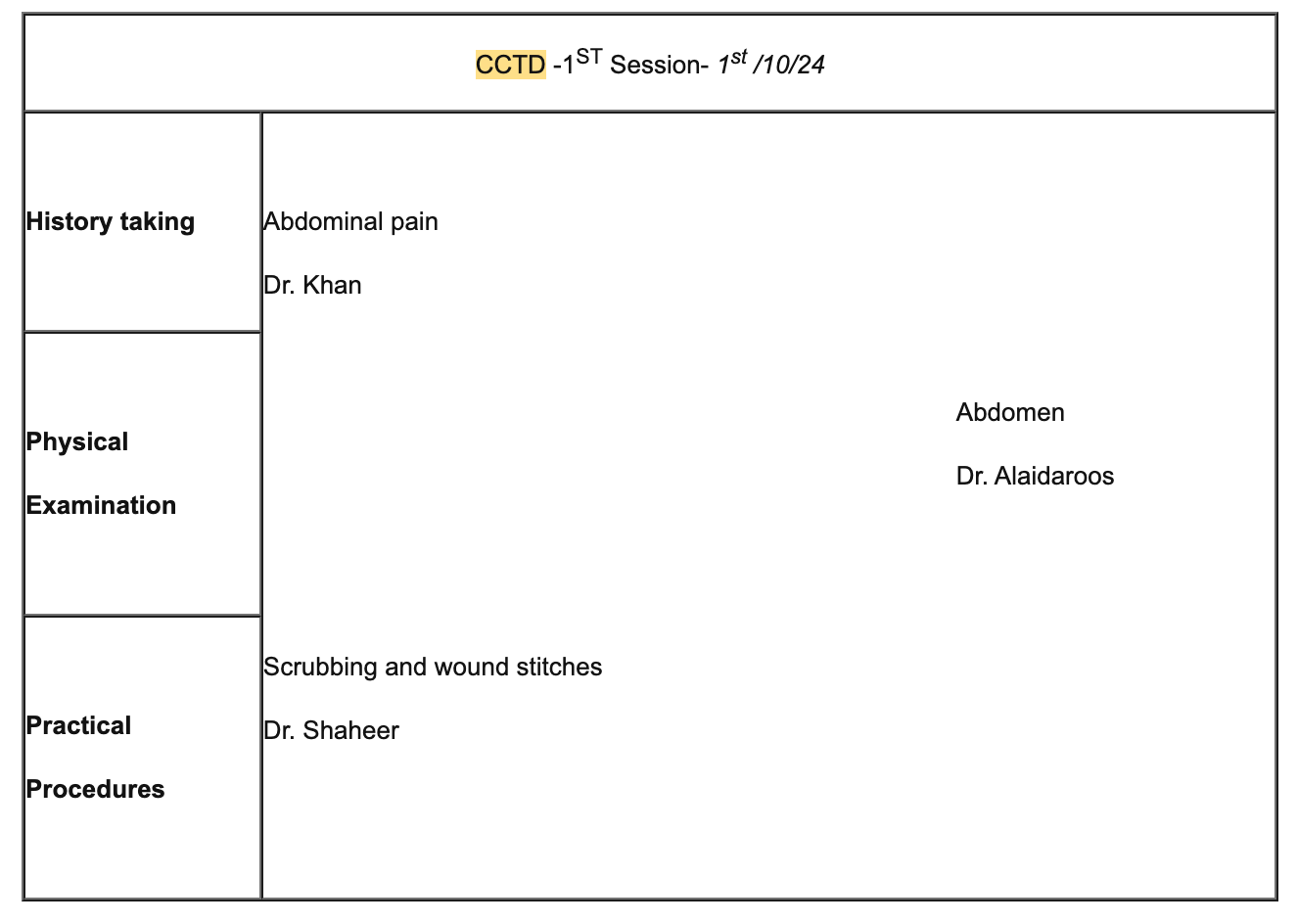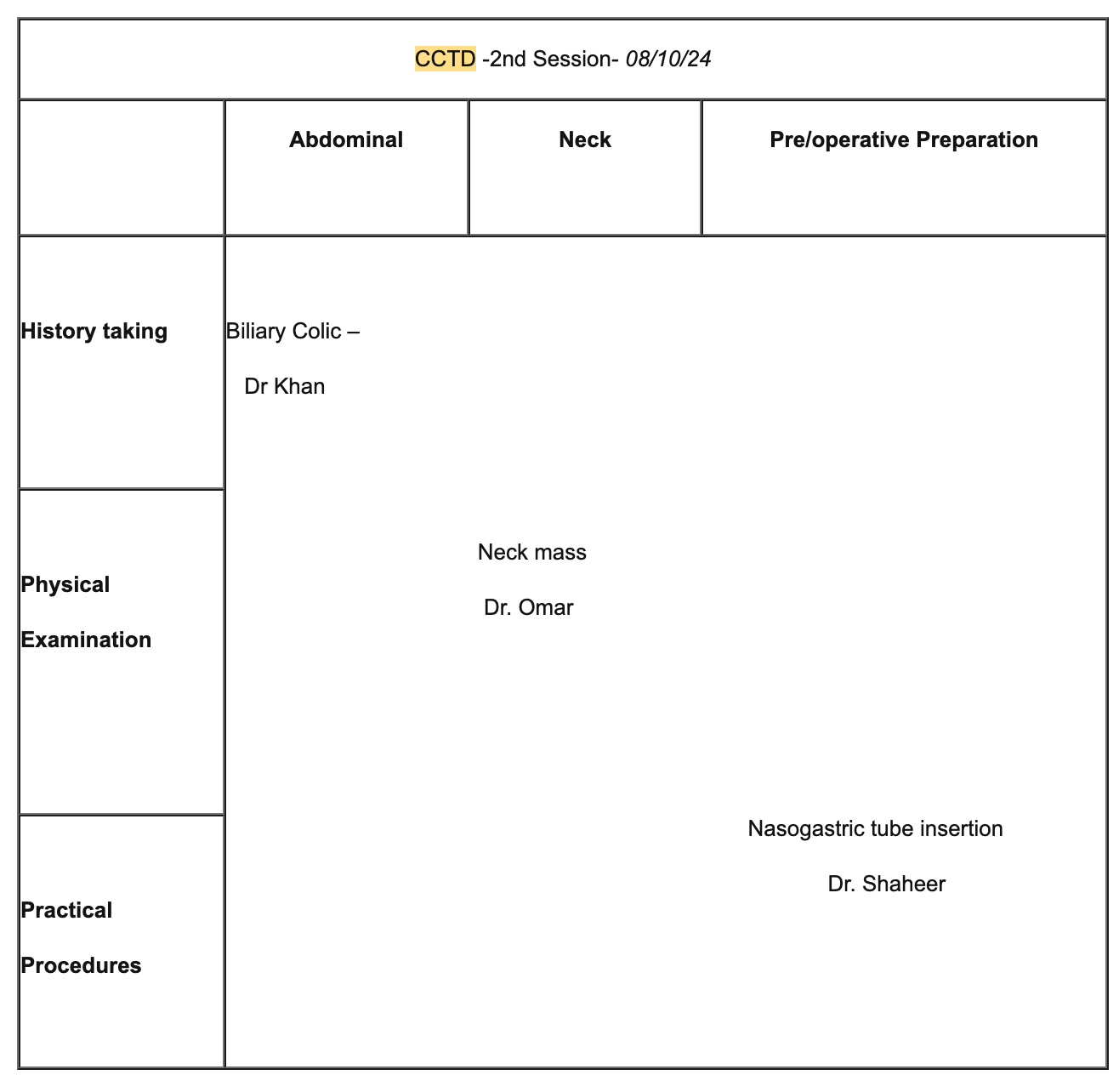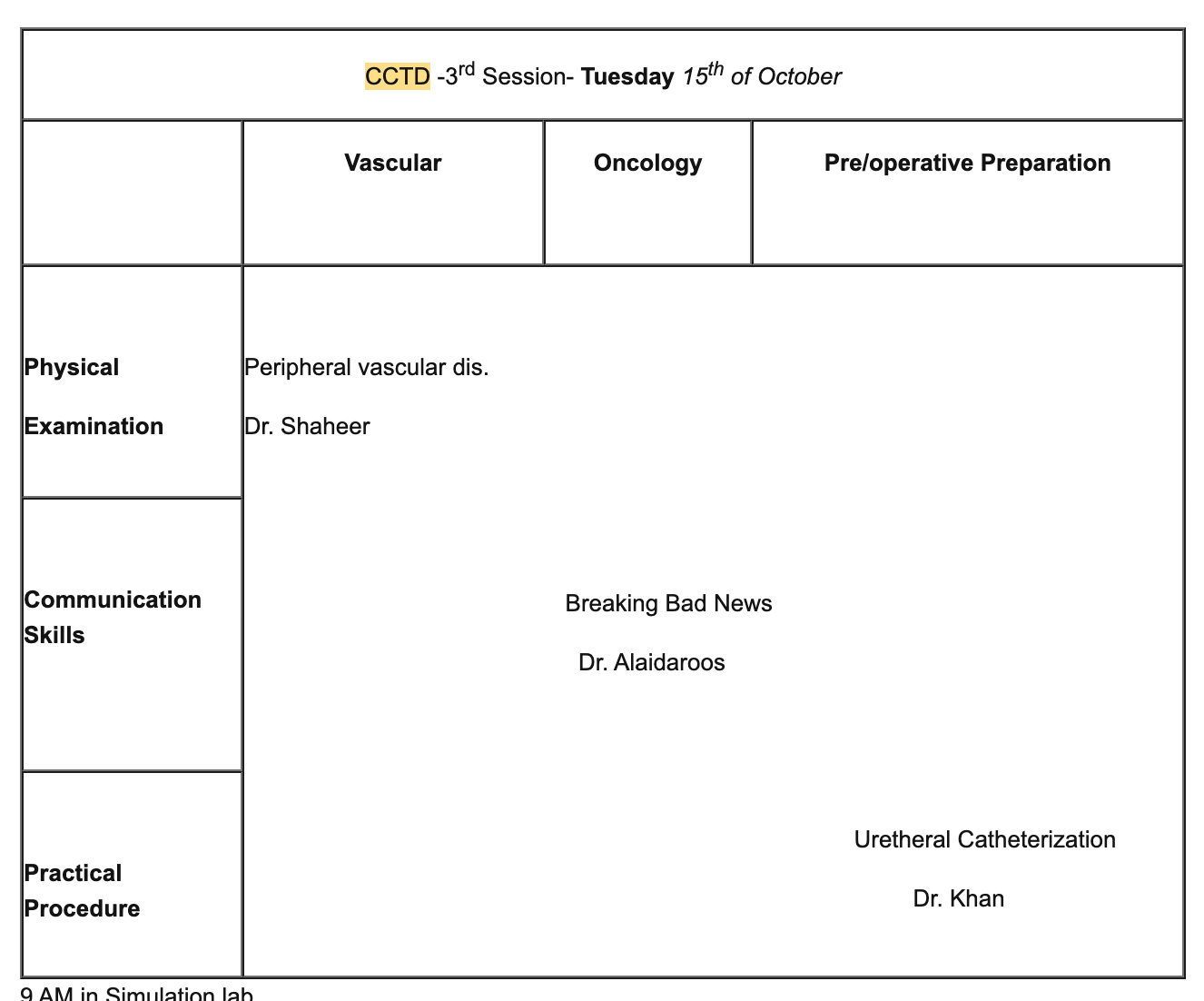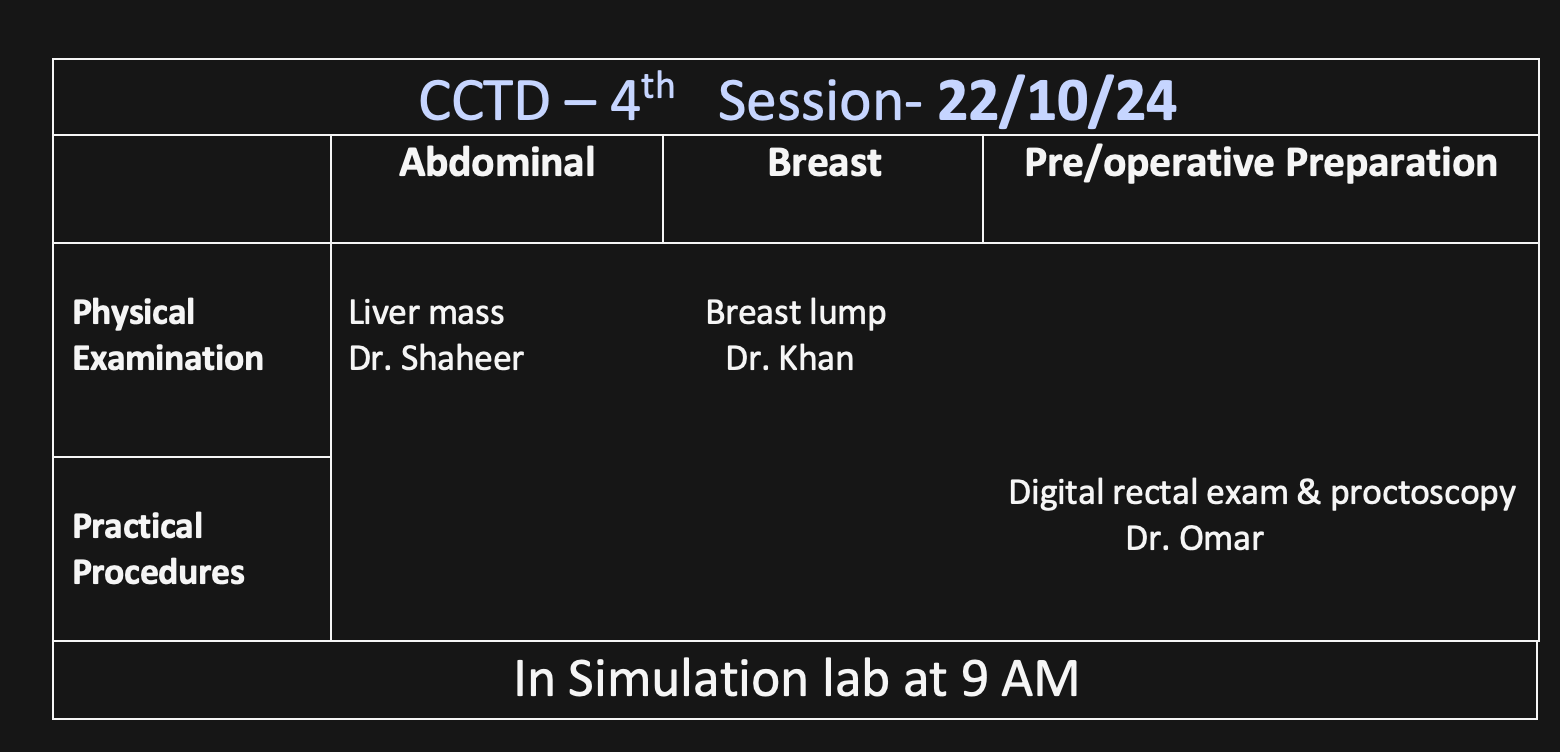Introduction to Surgery
Dr. Alaidaroos
Schedule
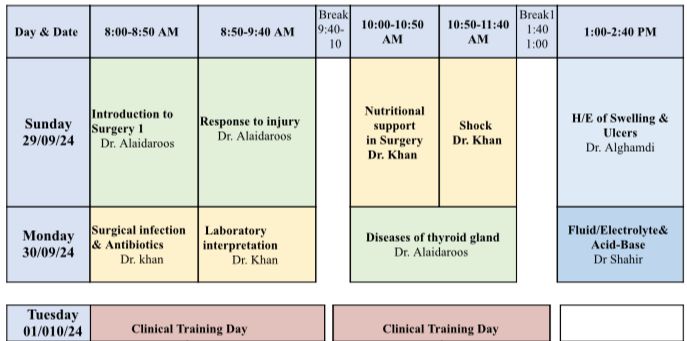





SURG 633
Dr. Omar Alaidaroos
Objectives
Perform & demonstrate:
- Self-learning & use of different teaching aids
- The spirit of dedication & concern
- Professional behavior with patients & their relatives
- Respect patient’s wishes, and privacy
- Importance of confidentiality of patient’s information
- Communication skills:
- Patient & their families in simple language
- Your colleagues
To provide:
- A broad-based theoretical knowledge of:
- Basic surgical principles.
- Common surgical diseases:
- (Epidemiology, aetiology, risk factors, pathophysiology, classification, clinical presentation, differential diagnosis, investigations, overall management, specific treatment, complications, and prognosis).
Perform & demonstrate clinical skills of:
- History taking.
- Clinical examination.
- Interpretation of clinical signs.
- Recording & presenting - history & clinical examination findings.
- Symptoms & signs of common surgical diseases.
- To formulate a differential diagnosis.
- Related investigation
- Management of surgical diseases/emergency.
Modified Course Learning Outcomes MCLO
Objective assessments - Components:
- Knowledge
- Skills
- Competence
Course Plan
Lectures/Tutorials/Clinical:
- Hospital posting (Monday & Tuesday)
- Lectures/Tutorials (Wednesday & Thursdays)
- Clinical Training Day, OSCE Practice (Sundays)
- Mid-Block examination:
- Case presentation & Logbook Checkup
- Final written exam (Theory)
- Final clinical exam
Lectures:
- Number of lectures (30).
- Duration of lectures: 45 minutes.
- Lecture topics and its ILOs are listed.
Lecture topics:
-
A. Principles of Surgery
- Shock
- Nutritional support of surgical patients
- Fluid/electrolytes disorders, acid-base disorder
- Metabolic response to injury
- Hemostasis (coagulation defects, blood products & blood transfusion)
- Wounds (wound healing, & management)
- Surgical infections & antibiotics
- Investigation of surgical patients
- Trauma (2 lectures)
- Preoperative assessment and management
- Post-operative care and complications
- Principles of surgical oncology
-
B. General Surgery
- Acute abdomen (2 lectures)
- Gallbladder & biliary tract diseases
- Diseases of the stomach
- Diseases of the duodenum
- Diseases of the small bowel
- Diseases of the large bowel
- Common neck swellings
- Diseases of the thyroid gland
- Diseases of adrenal and parathyroid
- Liver diseases
- Diseases of the pancreas
- Diseases of the spleen
- Diseases of the breast
- Common ano-rectal diseases
- Abdominal wall and hernia
- Diseases of the peritoneum and retroperitoneal space
- Principles of surgical oncology
Tutorials:
- Interactive sessions
- History & clinical examination (Different systems & body regions)
- Laboratory data interpretations
- Imaging study interpretations
Hospital Posting
-
Surgical units: All weeks
-
Attend: in-patient, operating room, emergency room & OPD
-
Actively participate: History/examination, & differential diagnosis
-
Present patient’s history, examination findings
-
Participate in case discussion with in-charge clinicians/deputies
-
Follow up & interpret investigation results (blood, imaging)
-
Attend operations whenever allowed
-
Display professional behavior at all times
-
Must abide by the hospital rules
-
Strictly adhere to the confidentiality of patients & hospital
-
Must follow the dress code
-
Carry own pen torch and stethoscope
-
Punctuality
-
No cancellations
-
Attendance sheets are submitted officially (am/pm)
Learning Points at Hospital Posting
- History & examination of different organ systems
- Study of imaging investigations
- Interpretation of laboratory investigations
- Nasogastric tube
- Wound drains
- Wound care
- IV lines
- Observe PR exam (Perform only after permission from the clinician in charge, & patient)
- Observe Proctoscopy (perform only after permission from the clinician in charge, & patient)
- Suturing
- Urinary catheterization- observe (Male & Female)
- Colostomy care (if available)
Marks Distribution
Mid-Block exam:
- 60 MCQs (15 Marks)
- Case presentation: PPT (5 Marks)
- Logbook checkup: (5 Marks)
Final examination
-
(75 Marks)
-
MCQ:
- 60 questions
- 15 Marks
-
Slide Show:
- 5 slides
- 10 Marks (Each slide 2 marks)
-
Case scenarios:
- 2 cases
- 10 Marks (Case scenario & questions)
-
OSCE: manned VS unmanned
- 5 stations ---- 10 station
- 20 Marks
- (X-ray, lab results, specimens, instruments, clinical pictures, history taking, clinical examination)
-
Clinical examination:
- 2 short cases, on patients in the hospital Vs OSCE
- 20 marks
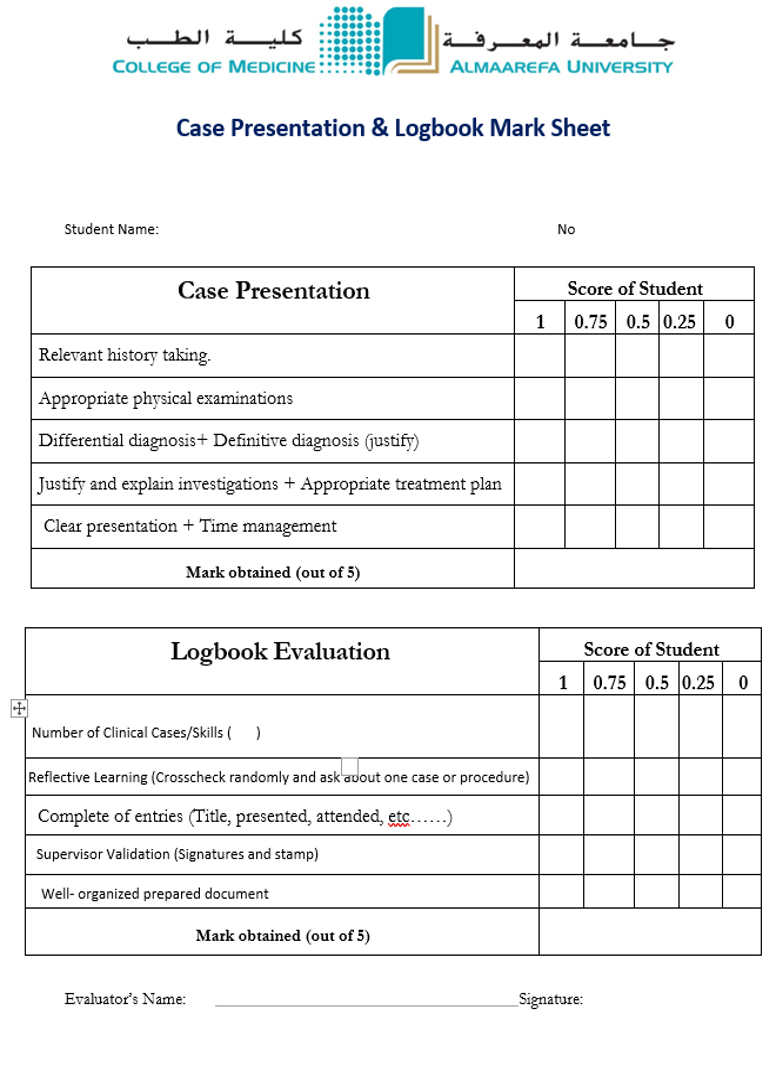
Topics Distribution
MCQs:
- Mid-block exam: The first 15 lectures/tutorials that have already been taken
- Final block exam: The remaining lectures & tutorials
Other examinations: All topics of the course
Blue Print for MCQ
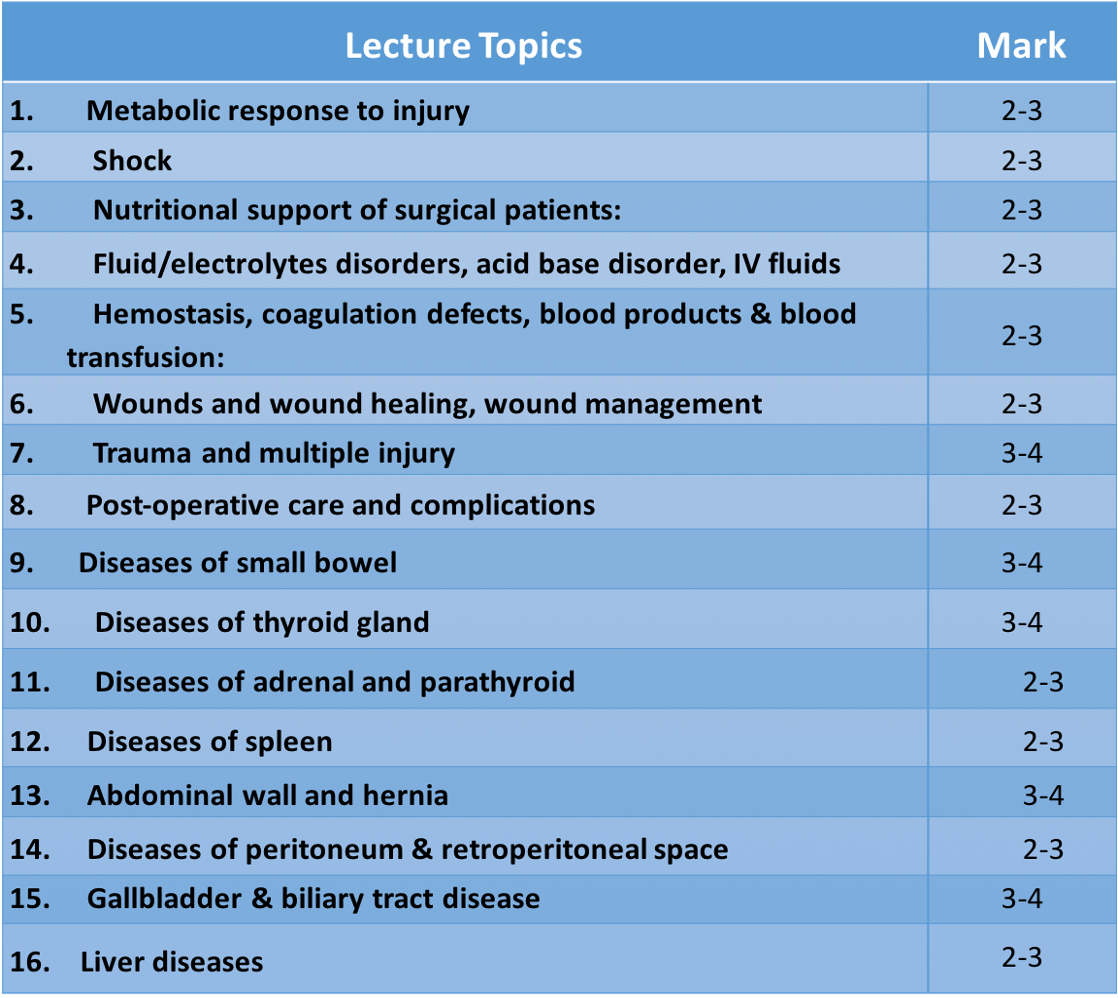
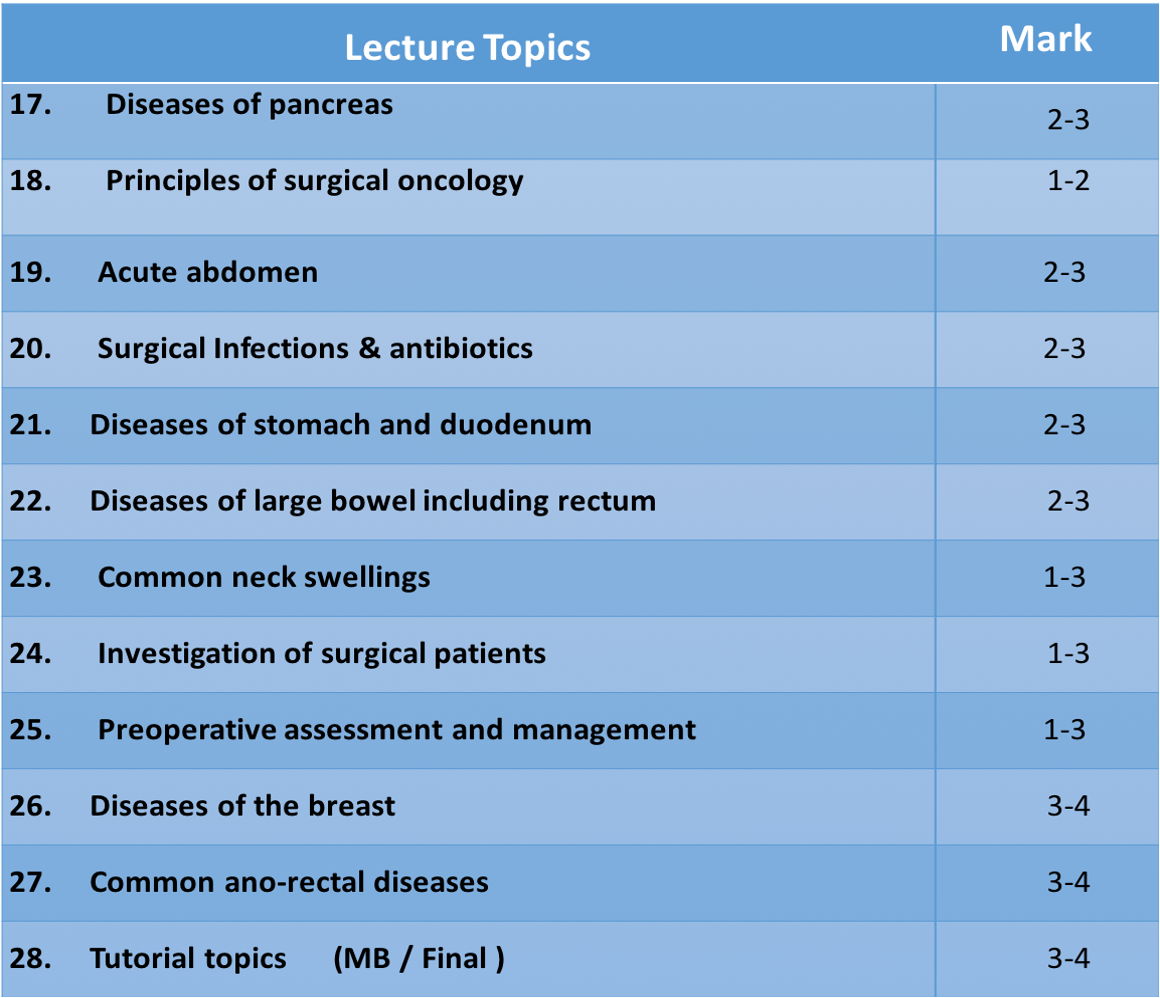
Clinical Short Case Mark Sheet
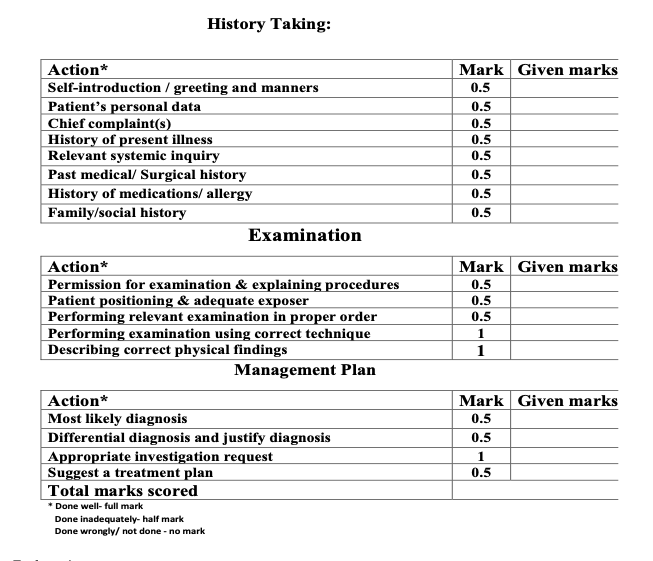
Important Points
- Professional behavior
- Responsibility
- Attendance, & punctuality (Hospital/University)
- Time management
- Start to prepare your assignments
- No postpone/Keep for tomorrow
- Maximum advantages of your time
- Link clinical to knowledge
- Think about the research project
- Use your official (university) email for communication
- Attendance, & punctuality (Hospital/University)
- 25% Absence: Deprivation
- Hospital: 6 times
- Not necessarily appears in the Portal Site
- Re-examination:
- Mention, Short-essay, explain, others
Recommended Books
- Browse’s Introduction to The Symptoms and Signs of Surgical Disease
- Principles and Practice of Surgery: Editors Garden, Bradbury, Forsythe, and Parks
- Pocket Books:
- Churchill’s pocketbook- Surgery by Raftery and Delbridge
- Oxford’s Handbook of Surgery
What is it?
It is like a book with different chapters reflecting the major clinical disciplines. As you rotate between the departments, you need to document your participation in any educational activity you have done. Simply submit your logbook for your clinical supervisor to sign it after the end of each activity. Further feedback about your performance is possible through the forms in the logbook. You must sign it on time as it is impossible to sign in retrospectively.
The Number of Cases Required?
You need to document at least 30 cases and 15 procedures from each discipline in your logbook, throughout your entire rotation i.e. Surgery 1 and 2
No Cases Available
Don’t worry!! There is another chance in the second part of a rotation to complete your logbook.
Any Mark for the Logbook?
A TOTAL OF 10 MARKS IS ALLOCATED FOR THE LOGBOOK. FIVE MARKS FOR EACH ROTATION IN ANY DISCIPLINE.
Submission Time
Before or on the day of your clinical case presentation day, the logbook will need to be submitted for marking.
If you miss the deadline, no marks will be given on the logbook!!
-
Abdomen exam, EX
-
Neck mass exam EX
-
Digital rectal exam & protoscopy EX
-
breaking bad news, SK
-
Abdominal Pain HX
-
Biliary colic HX
-
Urehtral Cath - SK
-
Breast Lump EX
-
Scrubbing & wound stiches SK
-
Nasogastric tube insertion SK
-
Peripheral vascular diseases EX
-
Liver mass EX
